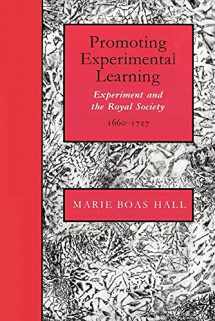
Promoting Experimental Learning: Experiment and the Royal Society, 1660–1727
ISBN-13:
9780521892650
ISBN-10:
0521892651
Author:
Marie Boas Hall
Publication date:
2002
Publisher:
Cambridge University Press
Format:
Paperback
224 pages
Category:
Reference
,
History & Philosophy
,
History of Technology
,
Technology
,
Engineering
FREE US shipping
Book details
ISBN-13:
9780521892650
ISBN-10:
0521892651
Author:
Marie Boas Hall
Publication date:
2002
Publisher:
Cambridge University Press
Format:
Paperback
224 pages
Category:
Reference
,
History & Philosophy
,
History of Technology
,
Technology
,
Engineering
Summary
Promoting Experimental Learning: Experiment and the Royal Society, 1660–1727 (ISBN-13: 9780521892650 and ISBN-10: 0521892651), written by authors
Marie Boas Hall, was published by Cambridge University Press in 2002.
With an overall rating of 3.6 stars, it's a notable title among other
Reference
(History & Philosophy, History of Technology, Technology, Engineering) books. You can easily purchase or rent Promoting Experimental Learning: Experiment and the Royal Society, 1660–1727 (Paperback) from BooksRun,
along with many other new and used
Reference
books
and textbooks.
And, if you're looking to sell your copy, our current buyback offer is $0.3.
Description
The Royal Society of London, effectively Britain's national academy of science, has been particularly concerned with experimental science. Despite all that has been written in the past decades about the first half-century of the Royal Society's existence, no one has yet examined what took place at the society's weekly meetings or how far these meetings fulfilled the expressed aim of promoting "experimental learning." Aware that Hooke performed many experiments at meetings between 1662 and 1703, students of the early Royal Society have often believed its aim to be fully expressed in the writings of such members as Boyle, Hooke, and Newton. This study attempts to analyze the content of the meetings in detail and to discover how far and in what manner the aims of the Society were fulfilled in the seventeenth and early eighteenth centuries. Also discussed are the reactions of foreigners and outsiders to the Royal Society, and how the Society was altered from 1660 to 1727, the year Newton, the Royal Society's president, died. This book should be of interest to historians of science and physicists alike.


We would LOVE it if you could help us and other readers by reviewing the book
Book review

Congratulations! We have received your book review.
{user}
{createdAt}
by {truncated_author}


